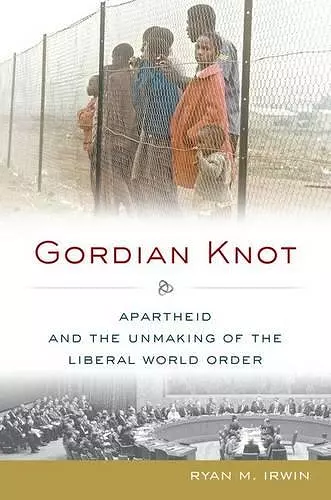Gordian Knot
Apartheid and the Unmaking of the Liberal World Order
Format:Hardback
Publisher:Oxford University Press Inc
Published:20th Sep '12
Currently unavailable, and unfortunately no date known when it will be back

Writing more than one hundred years ago, African American scholar W.E.B. Du Bois speculated that the great dilemma of the twentieth century would be the problem of "the color line." Nowhere was the dilemma of racial discrimination more entrenched--and more complex--than South Africa. This book looks at South Africa's freedom struggle in the years surrounding African decolonization, and it uses the global apartheid debate to explore the way new nation-states changed the international community during the mid-twentieth century. At the highpoint of decolonization, South Africa's problems shaped a transnational conversation about nationhood. Arguments about racial justice, which crested as Europe relinquished imperial control of Africa and the Caribbean, elided a deeper contest over the meaning of sovereignty, territoriality, and development. This contest was influenced--and had an impact on--the United States. Initially hopeful that liberal international institutions would amicably resolve the color line problem, Washington lost confidence as postcolonial diplomats took control of the U.N. agenda. The result was not only America's abandonment of the universalisms that propelled decolonization, but also the unraveling of the liberal order that remade politics during the twentieth century. Based on research in African, American, and European archives, Gordian Knot advances a bold new interpretation about African decolonization's relationship to American power. The book promises to shed light on U.S. foreign relations with the Third World and recast our understanding of liberal internationalism's fate after World War II.
Irwin's book offers insight into how apartheid struck at the root of the postcolonial narriative of justice and how it was used at the UN as a vehicle to challenge the liberal international order and the legitimacy of the nation state system. ... this is a critical addition to the field of literature. This gripping reinterpretation of the organisation and its use for burgeoning nation states raises many broader questions about the role of the UN as an agent of change in the international system. * Alanna O'Malley, Journal of African History *
Overall, this is an outstanding book. It is well-researched, crisply written, and thought-provoking. * Diplomatic History *
an enrichment for transnational and global history studies ... I can only join others reviewers in their appreciation of the book and hope that it will continue to be received widely and will find its way into curricula of Global, African and International Studies. * Angela Glodschei, geschichte.transnational *
ISBN: 9780199855612
Dimensions: 236mm x 160mm x 23mm
Weight: 476g
256 pages